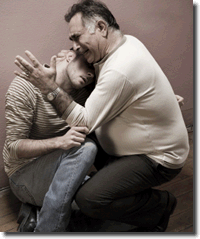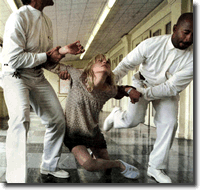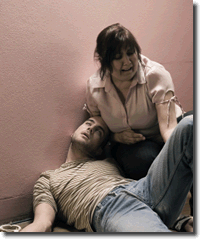
Ecstasy Overdose
An ecstasy overdose occurs when someone consumes more ecstasy than their body can tolerate. Ecstasy users are constantly flirting with the risk of a drug overdose. There is a fine line between the high they're seeking and serious injury or death. People who suffer an ecstasy overdose will experience overheating, panic attacks, faintness, severe dehydration and loss of consciousness. Ecstasy raises the user’s body temperature and makes them feel restless. These restless feelings often lead users to feel as though they have to keep moving, literally causing them to overheat and cook their insides. Some People who have had an ecstasy overdose and died have had body temps over 108 degrees.
Nationally, ecstasy-related visits have risen almost 75% from 2004 to 2008, according to the U.S. Centers for Disease Control and Prevention's (CDC), Morbidity and Mortality Weekly Report. And a recent national survey of teens found an increase in use of the drug in 2009, compared with 2008, and a decrease in perception of risk associated with it. In Los Angeles County, the number of residents entering treatment programs who cited ecstasy as their drug of choice increased by 650% between 2005 and 2009, according to recent data.
Bad reactions to ecstasy, in some cases mixed with alcohol or other drugs, were implicated in one death and 18 hospitalizations among people attending a 2010 New Year's Eve rave in Los Angeles, according to the report. According to the CDC team, 18 people were treated at a hospital within 12 hours of the L.A. rave. All were between 16 to 34 years of age, and nine were women. In addition to using ecstasy, 10 had used alcohol, and five used other drugs. Three patients were admitted to the hospital, one ending up in intensive care.
One patient had seizures, a breakdown of muscle tissue, kidney failure requiring hemodialysis, and liver failure. He recovered after a 28-day hospital stay, but continues to need dialysis. The patient who died passed away at home some 12 hours after the rave, according to the report. The coroner put the cause of death as "multiple drug intoxication," and friends reported that he had used ecstasy and cocaine while at the rave, and injected heroin upon his return home.
Another way people die from an ecstasy overdose is by taking fake ecstasy pills. Because ecstasy is made on the black market, users never truly know what is in the pills they are taking. The drug dealers who are making ecstasy do not really care if they use the right chemicals or not and how that will affect the people who they sell the drugs to.
That brings us to MDMA and PMA. "Ecstasy" is the street name of methylenedioxymethamphetamine, or MDMA. As its name implies, it's a variant of amphetamine, but technically it is not a designer drug. First synthesized early in the last century, MDMA was patented by Merck in 1914, long before the club and rave scene. Common street names include "e," "XTC," "Adam," "STP," "X," "clarity," and "lover's speed." Paramethoxymethamphetamine (PMA) is a designer-drug variant of MDMA--or at least an attempt at it. First synthesized in the 70's, it never became popular as a recreational drug for two reasons: low amusement value and high toxicity.
MDMA's documented effects include feelings of intimacy, a state of relaxation and euphoria, and rushes of exhilaration, as well as enhanced physical sensation. PMA produces somewhat similar effects at low doses--an increase in energy, minor visual hallucinations, and a mild euphoric state. At slightly higher doses, however, PMA suddenly increases the heart rate, blood pressure, and body temperature. In one documented case, an individual had a recorded body temperature of 115 degrees F (46.1 C).
A notable difference between MDMA and PMA is that PMA takes about a hour to have a noticeable effect while MDMA takes about fifteen minutes. It's believed that people overdose on PMA because they think it is MDMA. After fifteen minutes with no results they take another "hit," thinking the first one was no good. After another fifteen minutes passes and still nothing, they pop yet another and before you know it, the morgue has another resident.
While many who suffer from an ecstasy overdose recover without long term effects, there can be serious consequences. Some experience the failure of major organs such as their kidneys or liver, while others suffer from the failure of whole systems like the respiratory or circulatory systems. Patients who survive an ecstasy overdose may need kidney dialysis, a kidney or liver transplant, or ongoing care as a result of heart failure, stroke, or coma.
Death can occur in an ecstasy overdose situation, particularly if treatment is not started immediately. Ecstasy-related emergency room incidents increased nationwide from 250 in 1994, to 637 in 1997, to 1,142 in 1998, to 2,850 in 1999. Between 1998 and 2001, the number of Ecstasy-related emergency room visits in San Diego County increased from 14 to 51, said John Redman, co-chairman of the county Club Drug Task Force. "I am very alarmed by the numbers," said Redman. "The kids that are taking it are unaware of the dangers."
Ecstasy is a Schedule I synthetic, psychoactive drug possessing stimulant and hallucinogenic properties. It possesses chemical variations of the stimulant amphetamine or methamphetamine and a hallucinogen, most often mescaline. Illicit use of ecstasy did not become popular until the late 1980s and early 1990s. Ecstasy is frequently used in combination with other drugs, which increases the user’s risk of an ecstasy overdose. However, it is rarely consumed with alcohol, as alcohol is believed to diminish its effects. Ecstasy is most often distributed at late-night parties called "raves", nightclubs, and rock concerts.
Warning Signs of an Ecstasy Overdose:
- Becoming confused, not able to talk properly
- Fainting or collapsing
- Feeling hot or unwell
- Headache
- Loss of control over body movements
- Not Sweating
- Problems urinating
- Racing heart or pulse when resting
- Tremors
- Vomiting
An Ecstasy Overdose is Characterized by:
- Death in extreme cases
- Faintness
- High blood pressure
- Hypothermia
- Kidney and cardiovascular system failure
- Loss of consciousness
- Muscle breakdown
- Muscle cramping
- Panic attacks
- Permanent damage to sections of brain critical to thought and memory
- Rapid heartbeat
- Seizures
- Stroke









